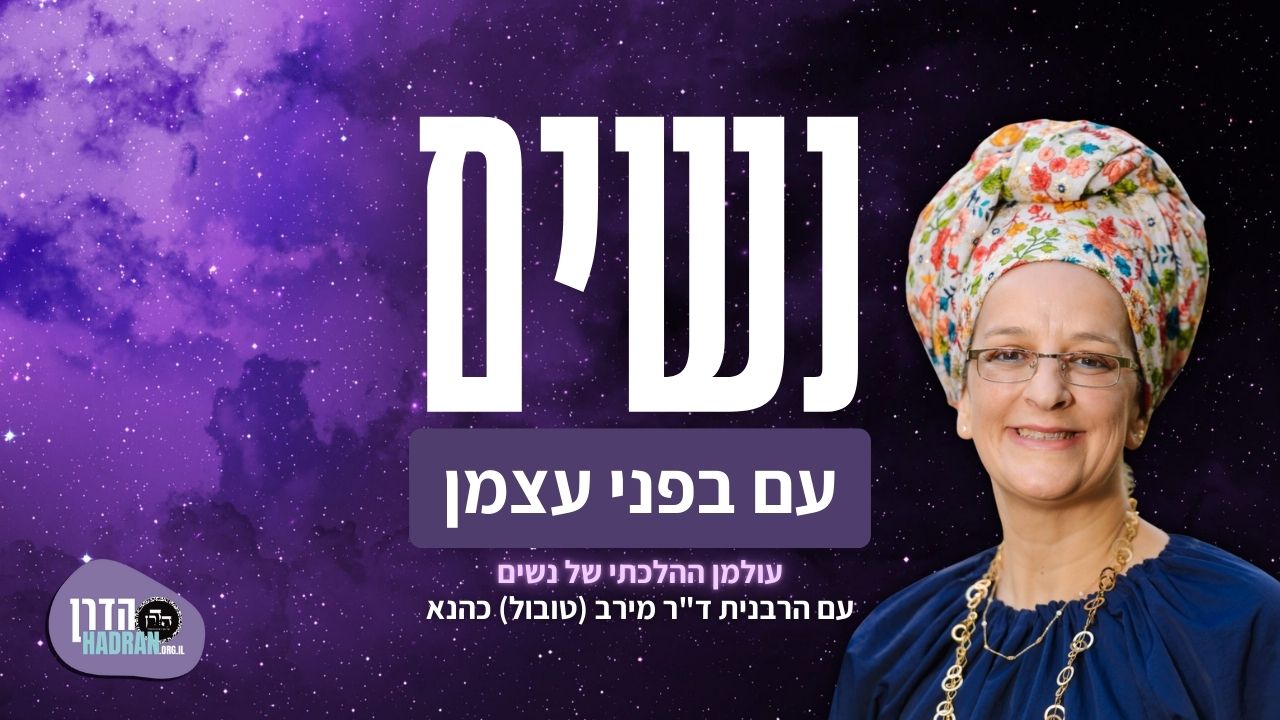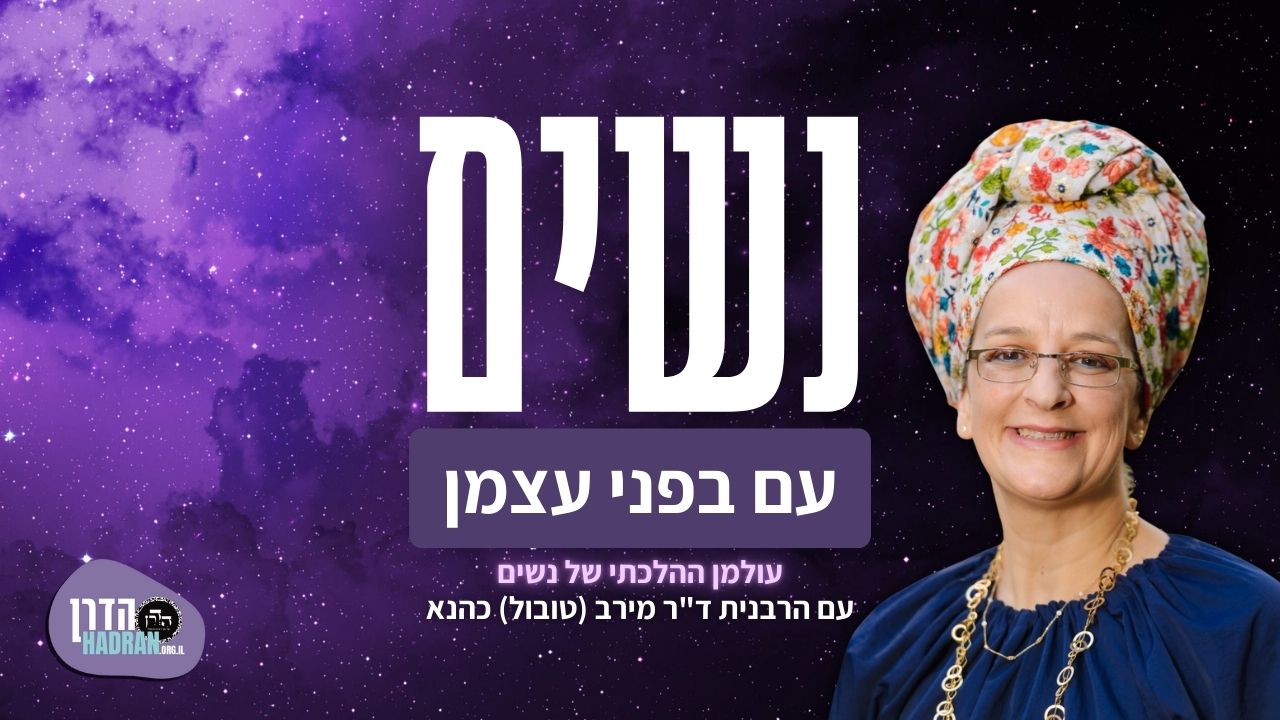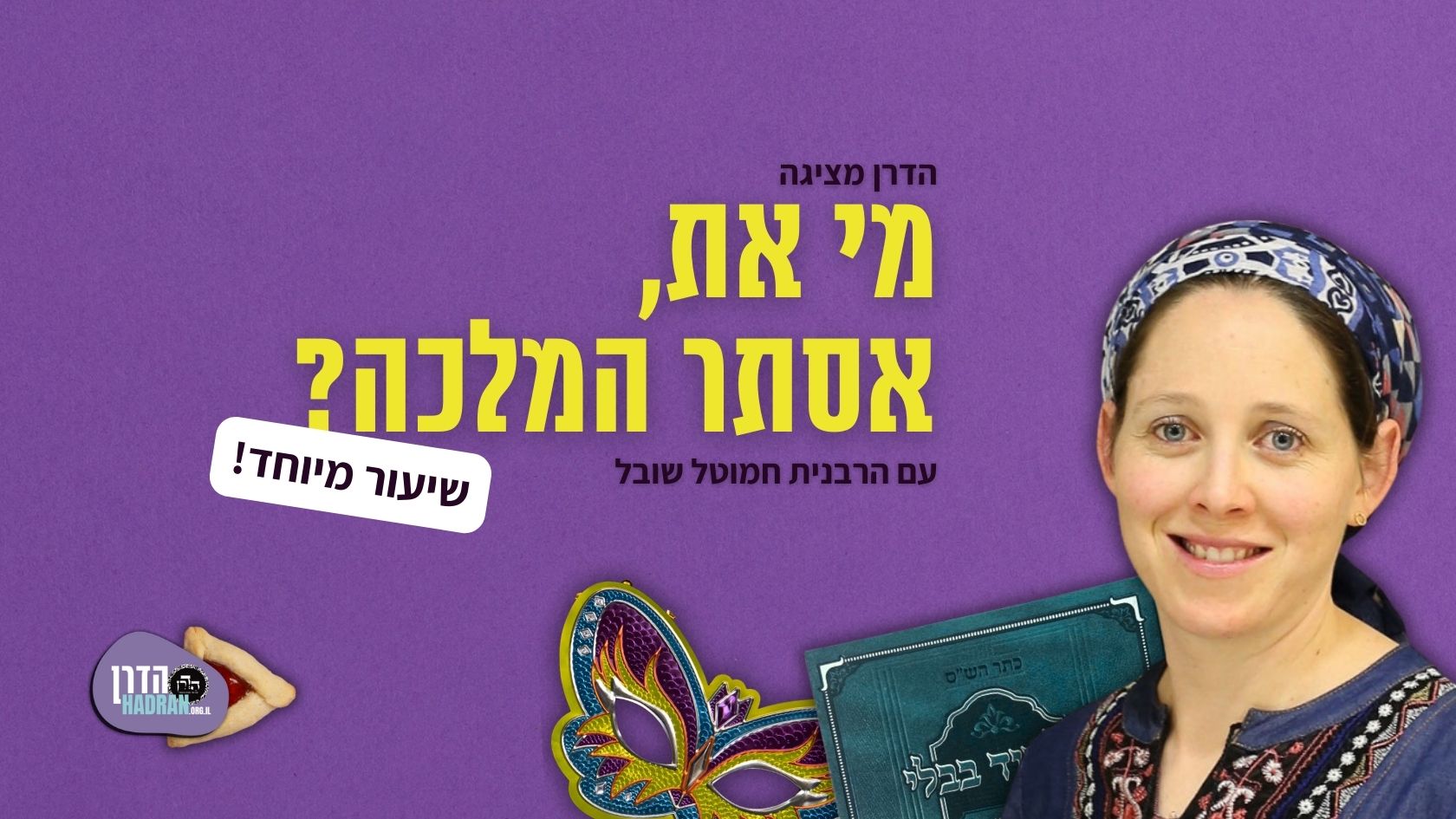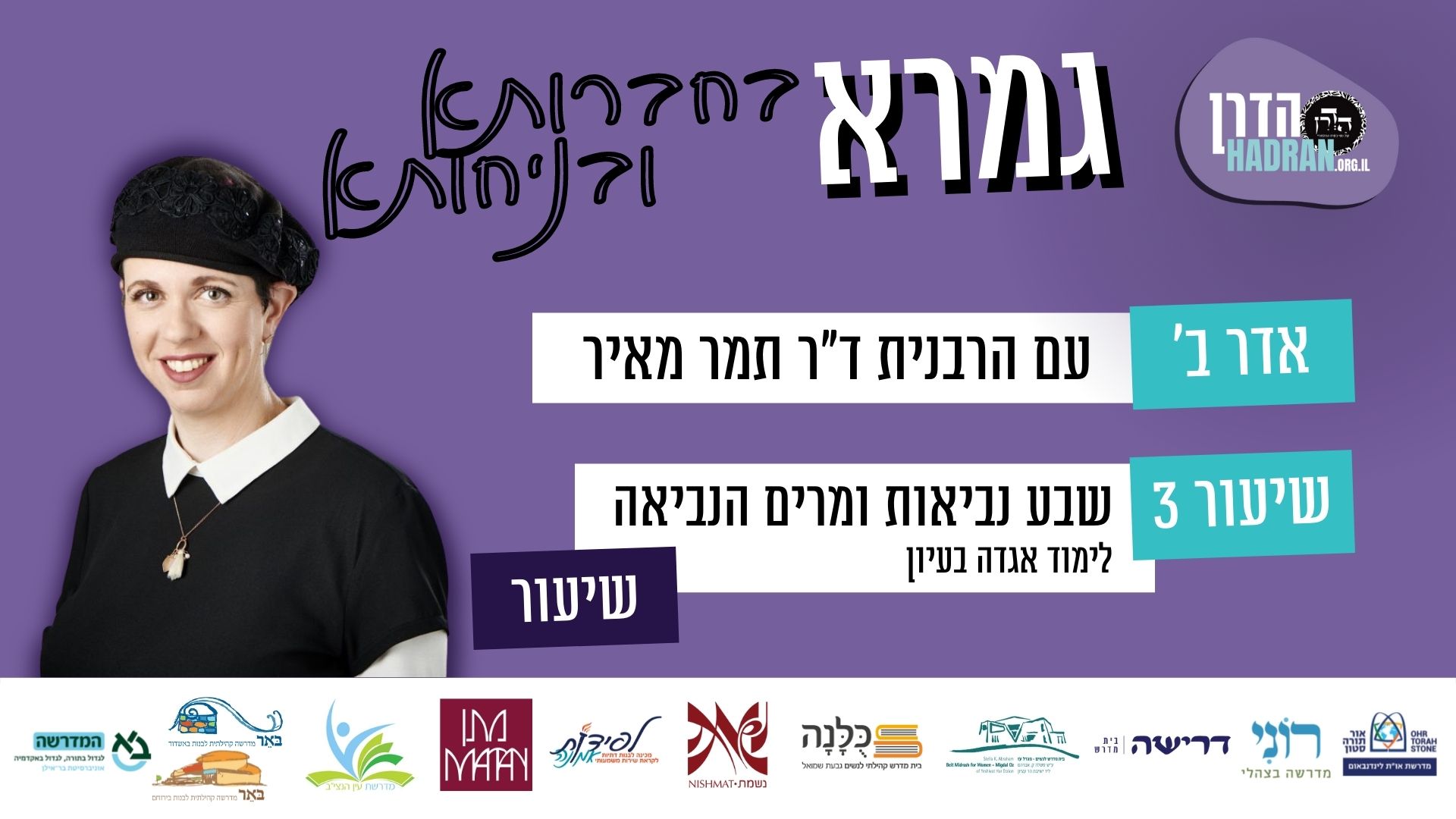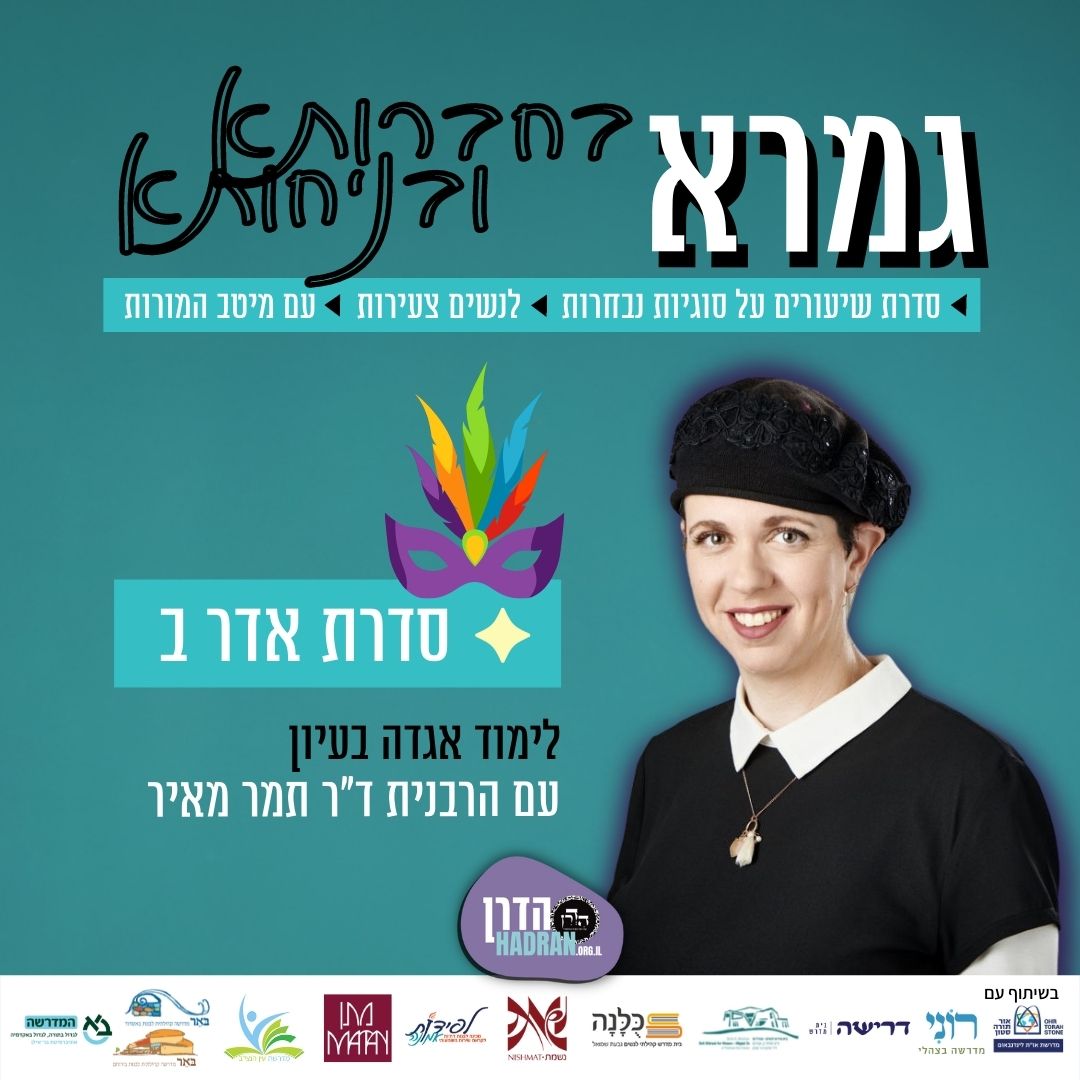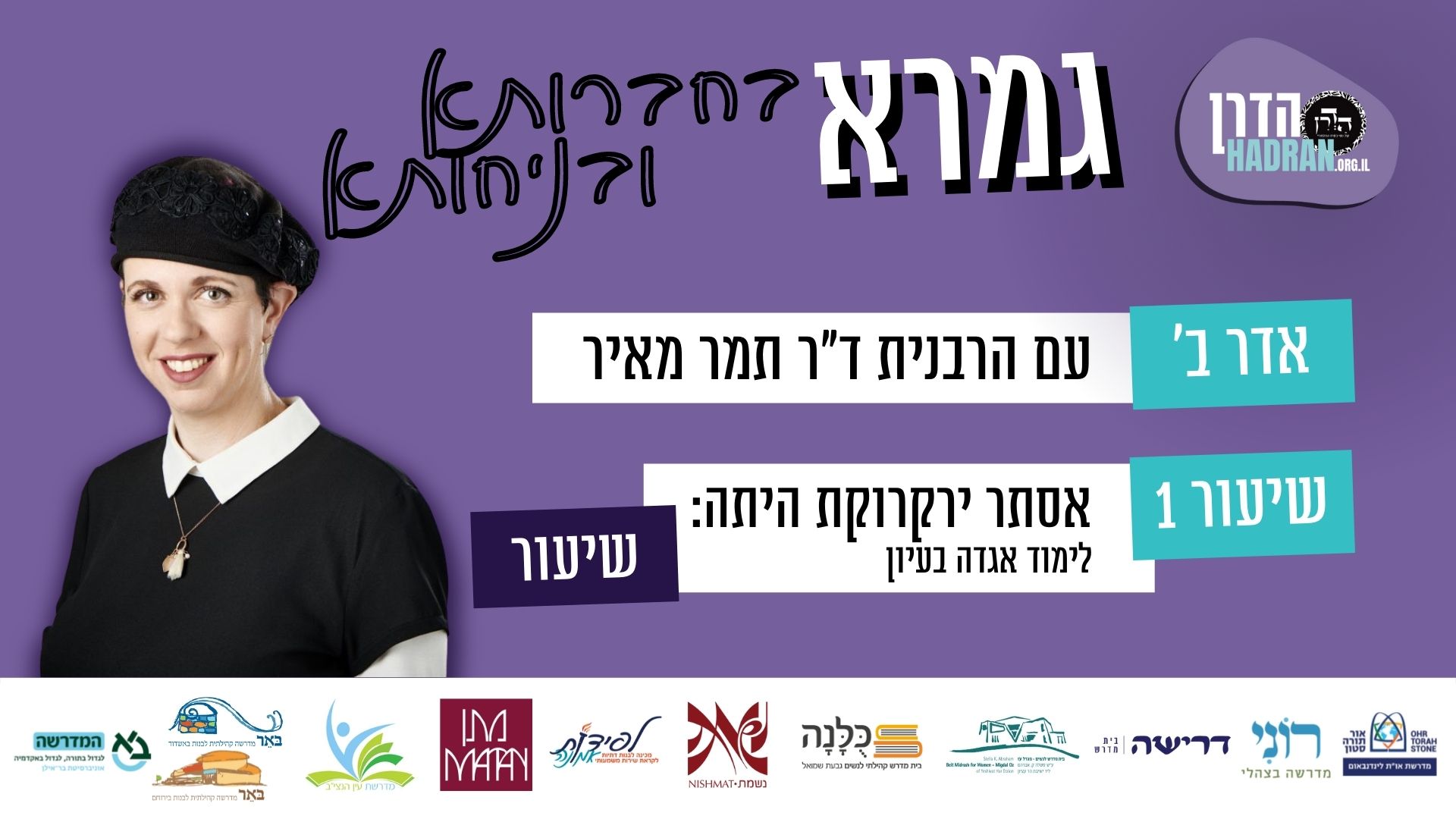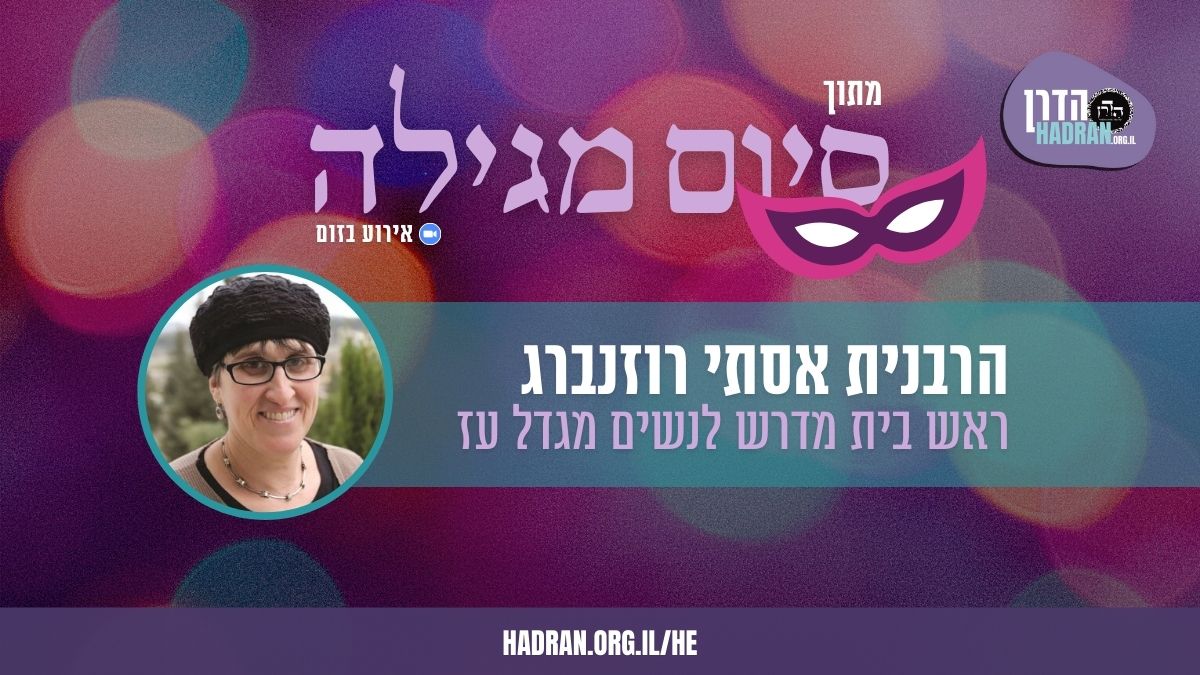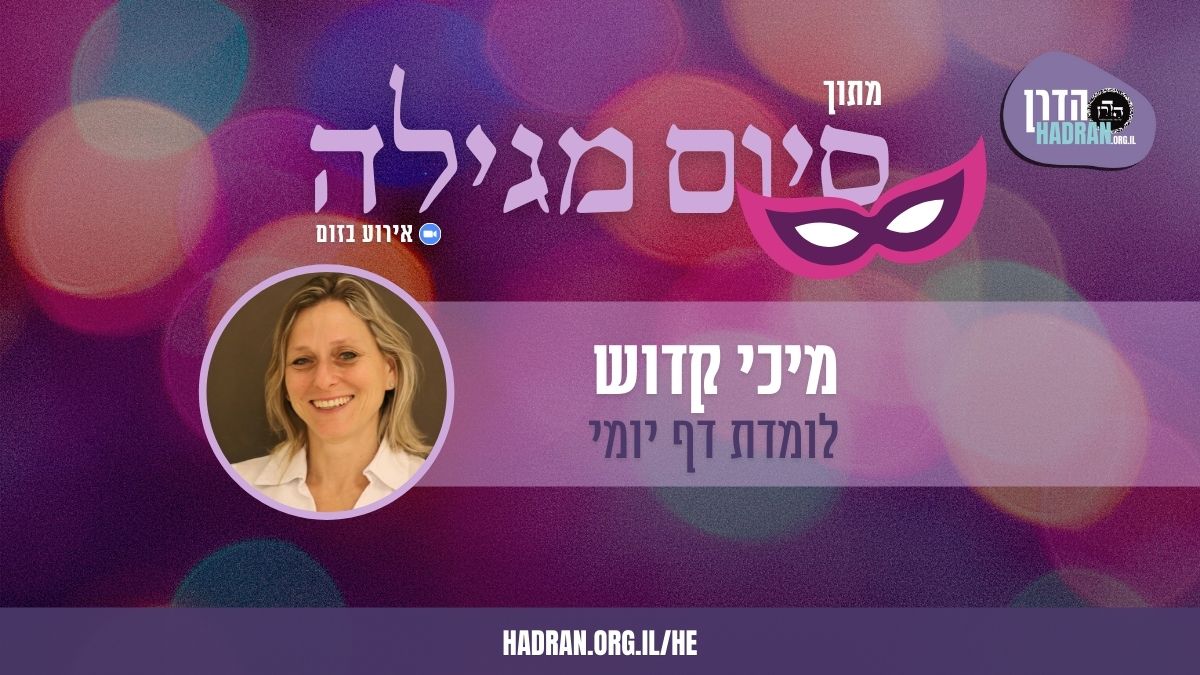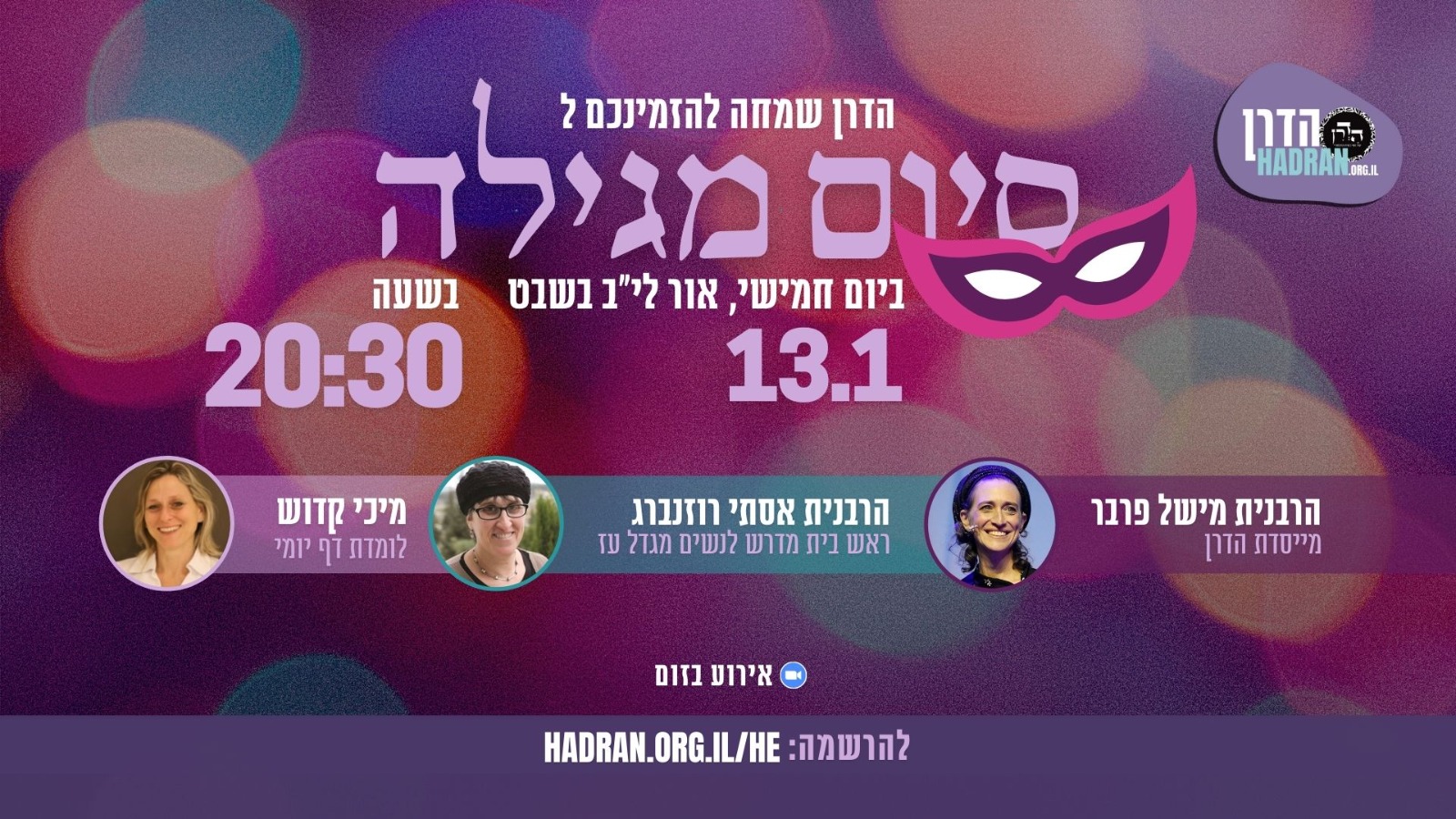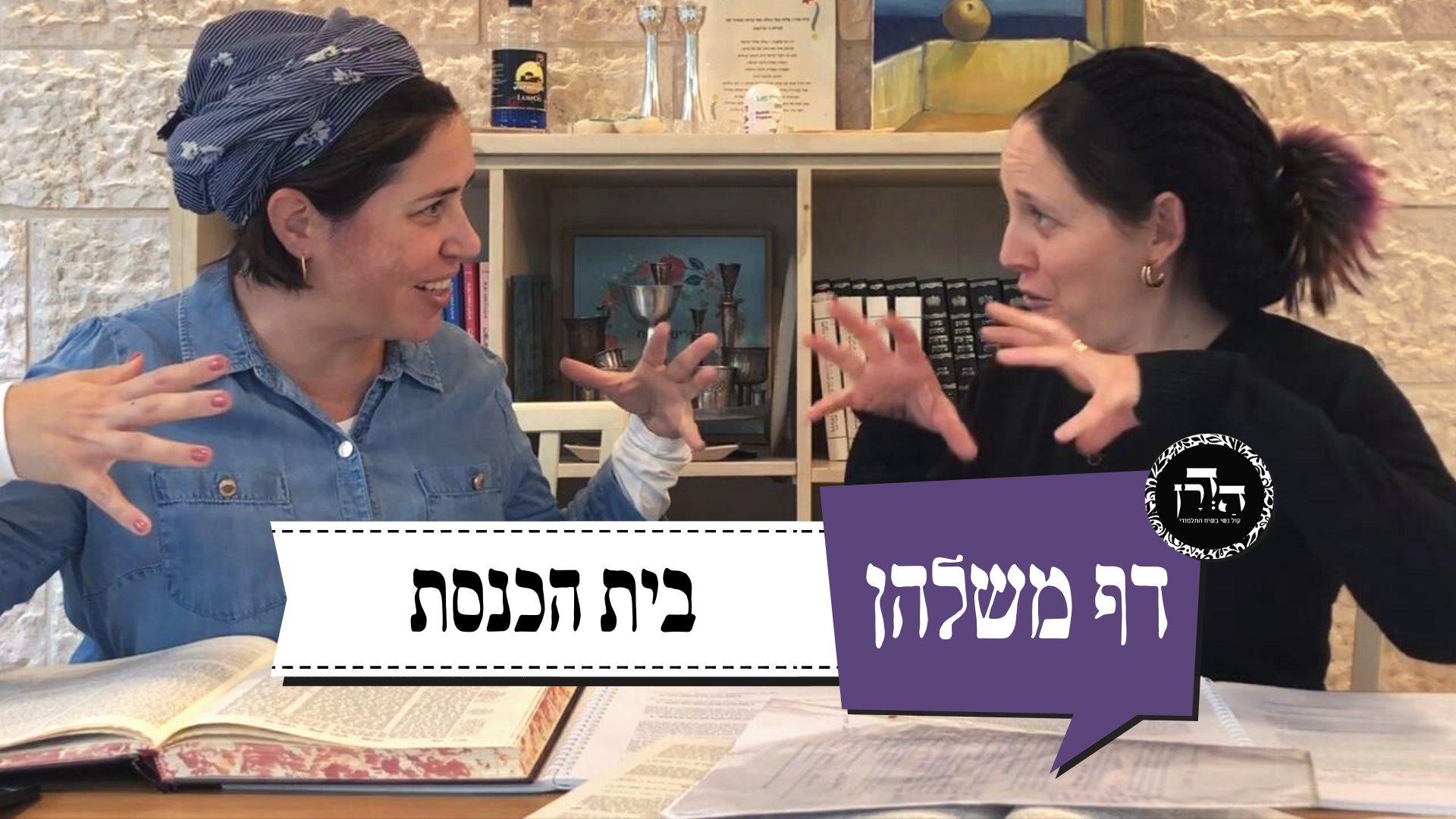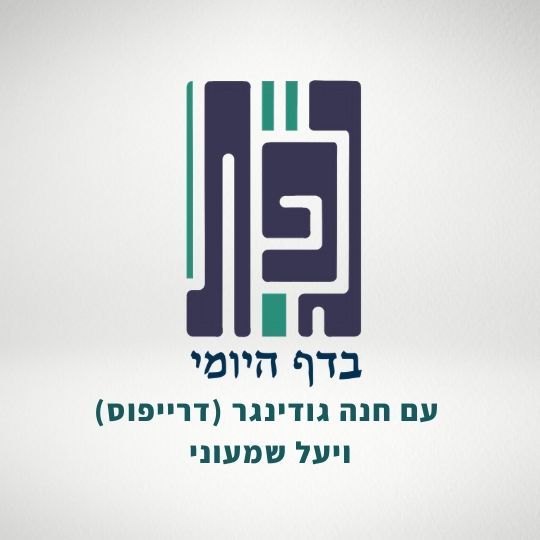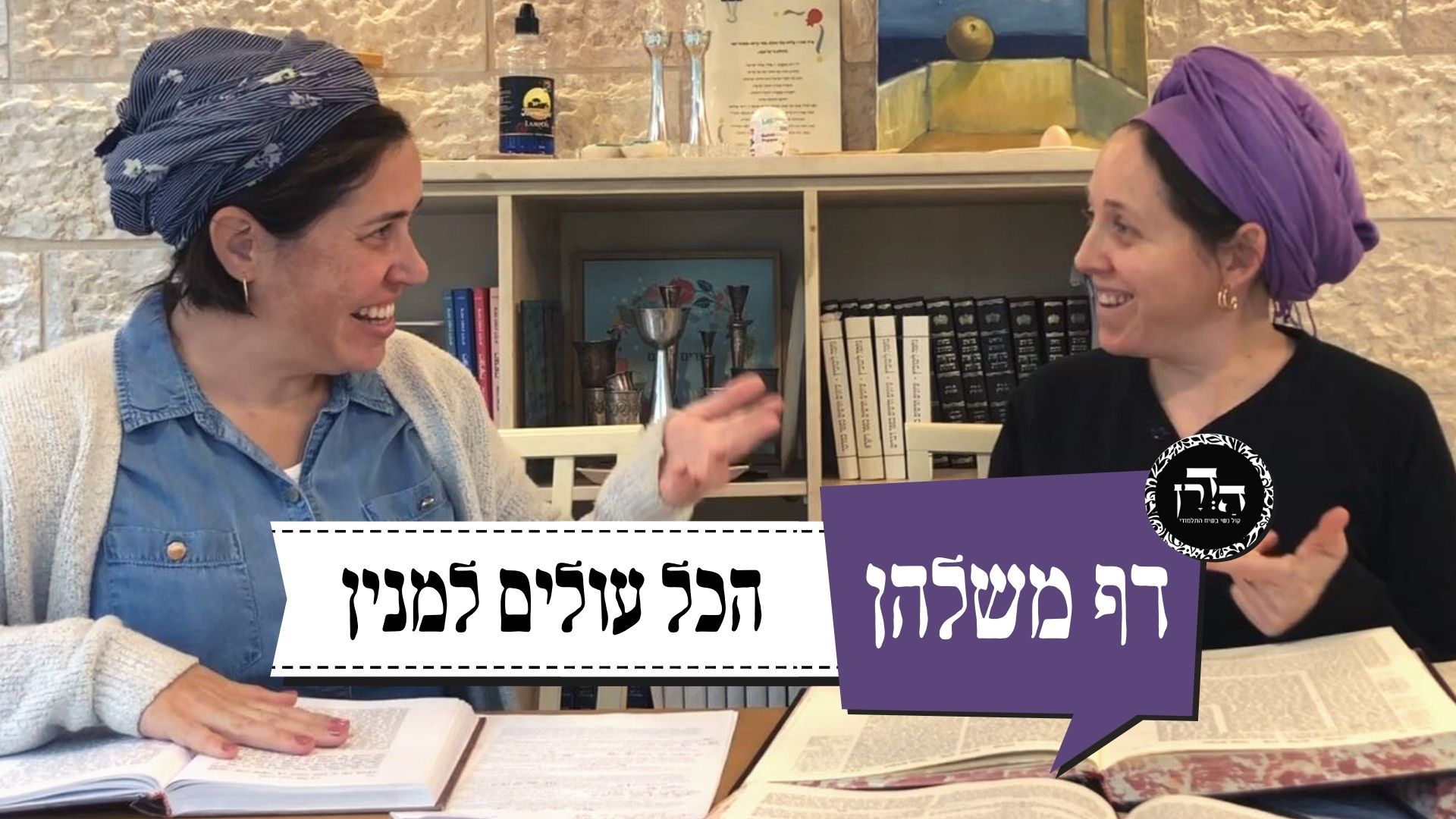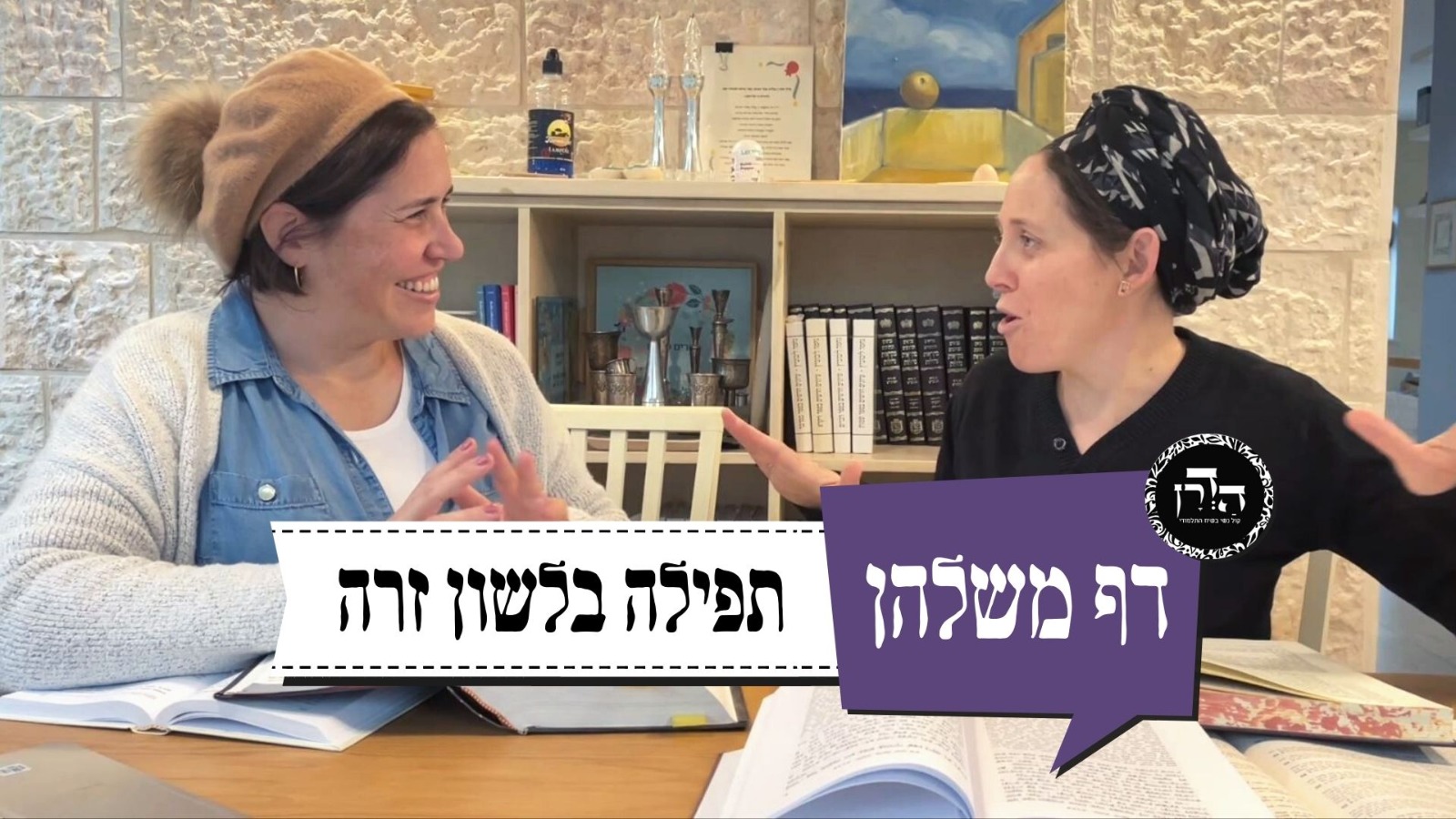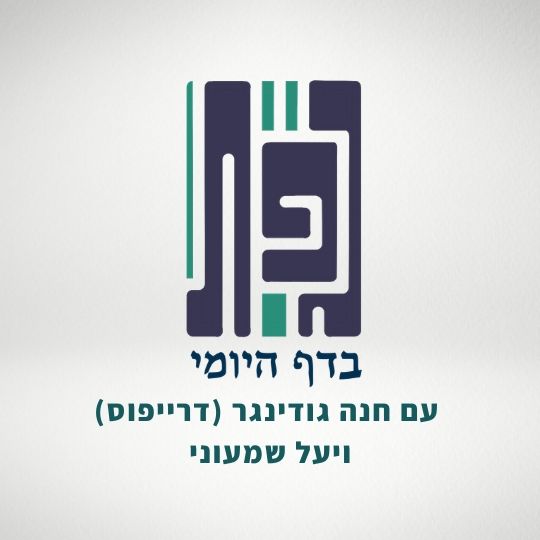אפשר לבטל תלמוד תורה ללויית המת או להכנסת כלה. האם יש מגבלות לדין זה? כשהיהודים יצאו לגלות, הקב”ה יצא איתם לגלות. את השכינה בבבל ניתן למצוא בבית הכנסת בהוצל או בשף ויתיב. מסופר על אלו שנתקלו בנוכחות השכינה במקומות אלו. בעתיד יובאו בתי הכנסיות הללו לישראל – מאיפה זה נדרש? מה משמעות המילה קפנדריא? באילו נסיבות אפשר להשתמש בבית כנסת כקפנדריא? מה לא ניתן לעשות בבית קברות מתוך כבוד המתים? מתי קוראים את ארבע הפרשיות שלפני פסח? מדוע קוראים את פרשת שקלים לפני או בראש חודש אדר? איזה חלק בתורה נקרא ביום זה? יש ויכוח בין רב ושמואל בעניין זה – או מפרשת כי תשא על גביית השקלים לבניית המשכן או הקטע שנקרא בראש חודש על קרבן התמיד וקרבנות שבת וראש חודש, שנרכשו מהשקלים שנאספו. 4 קושיות הובאו נגד שיטת רב ואחד נגד שיטת שמואל. אם הקריאה זהה לראש חודש, אז במה שונה הקריאה בשבת פרשת שקלים מהקריאה בחודש רגיל שבו חל ראש חודש בשבת? בראש חודש אדר שחל בשבת וראש חודש טבת שחל בשבת, מוציאים שלושה ספרי תורה. בראש חודש שחל בחנוכה ביום חול, כמה עליות קוראים בעניין ראש חודש וכמה בעניין חנוכה?
רוצה להקדיש שיעור?
כלים
העמקה
רוצה להבין מה באמת קורה מתחת לפני השטח של הסוגיה?
שיעורים, פודקאסטים והרחבות של מיטב המורות שלנו יפתחו לך עוד זוויות וכיווני חשיבה.
חדשה בלימוד הגמרא?
זה הדף הראשון שלך? איזו התרגשות עצומה! יש לנו בדיוק את התכנים והכלים שיעזרו לך לעשות את הצעדים הראשונים ללמידה בקצב וברמה שלך, כך תוכלי להרגיש בנוח גם בתוך הסוגיות המורכבות ומאתגרות.
פסיפס הלומדות שלנו
גלי את קהילת הלומדות שלנו, מגוון נשים, רקעים וסיפורים. כולן חלק מתנועה ומסע מרגש ועוצמתי.
מגילה כט
מְבַטְּלִין תַּלְמוּד תּוֹרָה לְהוֹצָאַת הַמֵּת, וּלְהַכְנָסַת הַכַּלָּה. אָמְרוּ עָלָיו עַל רַבִּי יְהוּדָה בְּרַבִּי אִילְעַאי שֶׁהָיָה מְבַטֵּל תַּלְמוּד תּוֹרָה לְהוֹצָאַת הַמֵּת וּלְהַכְנָסַת הַכַּלָּה. בַּמֶּה דְּבָרִים אֲמוּרִים — בְּשֶׁאֵין שָׁם כׇּל צוֹרְכּוֹ, אֲבָל יֵשׁ שָׁם כׇּל צוֹרְכּוֹ — אֵין מְבַטְּלִין.
One interrupts his Torah study to carry out the dead for burial and to escort a bride to her wedding. They said about Rabbi Yehuda, son of Rabbi Elai, that he would interrupt his Torah study to carry out the dead for burial and to escort a bride to her wedding. The Gemara qualifies this ruling: In what case is this statement said? Only where there are not sufficient numbers of other people available to perform these mitzvot and honor the deceased or the bride appropriately. However, when there are sufficient numbers, additional people should not interrupt their Torah study to participate.
וְכַמָּה כׇּל צוֹרְכּוֹ? אָמַר רַב שְׁמוּאֵל בַּר אִינְיָא מִשְּׁמֵיהּ דְּרַב: תְּרֵיסַר אַלְפֵי גַּבְרֵי, וְשִׁיתָּא אַלְפֵי שִׁיפּוּרֵי. וְאָמְרִי לַהּ: תְּרֵיסַר אַלְפֵי גַּבְרֵי, וּמִינַּיְיהוּ שִׁיתָּא אַלְפֵי שִׁיפּוּרֵי. עוּלָּא אָמַר: כְּגוֹן דְּחָיְיצִי גַּבְרֵי מֵאֲבוּלָּא עַד סִיכְרָא.
The Gemara asks: And how many people are considered sufficient? Rav Shmuel bar Inya said in the name of Rav: Twelve thousand men and another six thousand men to blow horns as a sign of mourning. And some say a different version: Twelve thousand men, among whom are six thousand men with horns. Ulla said: For example, enough to make a procession of people all the way from the town gate [abbula] to the place of burial.
רַב שֵׁשֶׁת אָמַר: כִּנְתִינָתָהּ כָּךְ נְטִילָתָהּ. מָה נְתִינָתָהּ בְּשִׁשִּׁים רִיבּוֹא, אַף נְטִילָתָהּ בְּשִׁשִּׁים רִיבּוֹא. הָנֵי מִילֵּי לְמַאן דְּקָרֵי וְתָנֵי, אֲבָל לְמַאן דְּמַתְנֵי — לֵית לֵיהּ שִׁיעוּרָא.
Rav Sheshet said: As the Torah was given, so it should be taken away, i.e., the same honor that was provided when the Torah was given at Mount Sinai should be provided when the Torah is taken through the passing away of a Torah scholar. Just as the Torah was given in the presence of six hundred thousand men, so too its taking should be done in the presence of six hundred thousand men. The Gemara comments: This applies to someone who read the Bible and studied halakhot for himself. But for someone who taught others, there is no limit to the honor that should be shown to him.
תַּנְיָא, רַבִּי שִׁמְעוֹן בֶּן יוֹחַי אוֹמֵר: בּוֹא וּרְאֵה כַּמָּה חֲבִיבִין יִשְׂרָאֵל לִפְנֵי הַקָּדוֹשׁ בָּרוּךְ הוּא, שֶׁבְּכָל מָקוֹם שֶׁגָּלוּ — שְׁכִינָה עִמָּהֶן. גָּלוּ לְמִצְרַיִם — שְׁכִינָה עִמָּהֶן, שֶׁנֶּאֱמַר: ״הַנִּגְלֹה נִגְלֵיתִי לְבֵית אָבִיךָ בִּהְיוֹתָם בְּמִצְרַיִם וְגוֹ׳״. גָּלוּ לְבָבֶל — שְׁכִינָה עִמָּהֶן, שֶׁנֶּאֱמַר: ״לְמַעַנְכֶם שֻׁלַּחְתִּי בָבֶלָה״. וְאַף כְּשֶׁהֵן עֲתִידִין לִיגָּאֵל — שְׁכִינָה עִמָּהֶן, שֶׁנֶּאֱמַר: ״וְשָׁב ה׳ אֱלֹהֶיךָ אֶת שְׁבוּתְךָ״. ״וְהֵשִׁיב״ לֹא נֶאֱמַר, אֶלָּא ״וְשָׁב״. מְלַמֵּד שֶׁהַקָּדוֹשׁ בָּרוּךְ הוּא שָׁב עִמָּהֶן מִבֵּין הַגָּלִיּוֹת.
§ It is taught in a baraita: Rabbi Shimon ben Yoḥai says: Come and see how beloved the Jewish people are before the Holy One, Blessed be He. As every place they were exiled, the Divine Presence went with them. They were exiled to Egypt, and the Divine Presence went with them, as it is stated: “Did I reveal myself to the house of your father when they were in Egypt?” (I Samuel 2:27). They were exiled to Babylonia, and the Divine Presence went with them, as it is stated: “For your sake I have sent to Babylonia” (Isaiah 43:14). So too, when, in the future, they will be redeemed, the Divine Presence will be with them, as it is stated: “Then the Lord your God will return with your captivity” (Deuteronomy 30:3). It does not state: He will bring back, i.e., He will cause the Jewish people to return, but rather it says: “He will return,” which teaches that the Holy One, Blessed be He, will return together with them from among the various exiles.
בְּבָבֶל הֵיכָא? אָמַר אַבָּיֵי: בְּבֵי כְּנִישְׁתָּא דְּהוּצָל, וּבְבֵי כְּנִישְׁתָּא דְּ״שַׁף וִיתֵיב״ בִּנְהַרְדְּעָא. וְלָא תֵּימָא הָכָא וְהָכָא, אֶלָּא זִמְנִין הָכָא וְזִמְנִין הָכָא. אָמַר אַבָּיֵי: תֵּיתֵי לִי, דְּכִי מְרַחַיקְנָא פַּרְסָה, עָיֵילְנָא וּמְצַלֵּינָא הָתָם. אֲבוּהּ דִּשְׁמוּאֵל [וְלֵוִי] הֲווֹ יָתְבִי בִּכְנִישְׁתָּא דְּשַׁף וִיתֵיב בִּנְהַרְדְּעָא. אֲתַאי שְׁכִינָה, שְׁמַעוּ קוֹל רִיגְשָׁא [קָמוּ וּנְפַקוּ.
The Gemara asks: Where in Babylonia does the Divine Presence reside? Abaye said: In the ancient synagogue of Huzal and in the synagogue that was destroyed and rebuilt in Neharde’a. And do not say that the Divine Presence resided here and there, i.e., in both places simultaneously. Rather, at times it resided here in Huzal and at times there in Neharde’a. Abaye said: I have a blessing coming to me, for whenever I am within a distance of a parasang from one of those synagogues, I go in and pray there, due to the special honor and sanctity attached to them. It was related that the father of Shmuel and Levi were once sitting in the synagogue that was destroyed and rebuilt in Neharde’a. The Divine Presence came and they heard a loud sound, so they arose and left.
רַב שֵׁשֶׁת הֲוָה יָתֵיב בְּבֵי כְּנִישְׁתָּא דְּשַׁף וִיתֵיב בִּנְהַרְדְּעָא, אֲתַאי שְׁכִינָה] וְלָא נְפַק. אֲתוֹ מַלְאֲכֵי הַשָּׁרֵת וְקָא מְבַעֲתוּ לֵיהּ. אָמַר לְפָנָיו: רִבּוֹנוֹ שֶׁל עוֹלָם, עָלוּב וְשֶׁאֵינוֹ עָלוּב, מִי נִדְחֶה מִפְּנֵי מִי? אֲמַר לְהוּ: שִׁבְקוּהוּ.
It was further related that Rav Sheshet was once sitting in the synagogue that was destroyed and rebuilt in Neharde’a, and the Divine Presence came but he did not go out. The ministering angels came and were frightening him in order to force him to leave. Rav Sheshet turned to God and said before Him: Master of the Universe, if one is wretched and the other is not wretched, who should defer to whom? Shouldn’t the one who is not wretched give way to the one who is? Now I am blind and wretched; why then do you expect me to defer to the angels? God then turned to the angels and said to them: Leave him.
״וָאֱהִי לָהֶם לְמִקְדָּשׁ מְעַט״, אָמַר רַבִּי יִצְחָק: אֵלּוּ בָּתֵּי כְנֵסִיּוֹת וּבָתֵּי מִדְרָשׁוֹת שֶׁבְּבָבֶל. וְרַבִּי אֶלְעָזָר אָמַר: זֶה בֵּית רַבֵּינוּ שֶׁבְּבָבֶל.
The verse states: “Yet I have been to them as a little sanctuary in the countries where they have come” (Ezekiel 11:16). Rabbi Yitzḥak said: This is referring to the synagogues and study halls in Babylonia. And Rabbi Elazar said: This is referring to the house of our master, i.e., Rav, in Babylonia, from which Torah issues forth to the entire world.
דָּרֵשׁ רָבָא, מַאי דִּכְתִיב: ״ה׳ מָעוֹן אַתָּה הָיִיתָ לָּנוּ״, אֵלּוּ בָּתֵּי כְנֵסִיּוֹת וּבָתֵּי מִדְרָשׁוֹת. אָמַר אַבָּיֵי: מֵרֵישׁ הֲוַאי גָּרֵיסְנָא בְּבֵיתָא וּמְצַלֵּינָא בְּבֵי כְנִישְׁתָּא, כֵּיוָן דִּשְׁמַעִית לְהָא דְּקָאָמַר דָּוִד: ״ה׳ אָהַבְתִּי מְעוֹן בֵּיתֶךָ״, הֲוַאי גָּרֵיסְנָא בְּבֵי כְנִישְׁתָּא.
Rava interpreted a verse homiletically: What is the meaning of that which is written: “Lord, You have been our dwelling place in all generations” (Psalms 90:1)? This is referring to the synagogues and study halls. Abaye said: Initially, I used to study Torah in my home and pray in the synagogue. Once I heard and understood that which King David says: “Lord, I love the habitation of Your house” (Psalms 26:8), I would always study Torah in the synagogue, to express my love for the place in which the Divine Presence resides.
תַּנְיָא, רַבִּי אֶלְעָזָר הַקַּפָּר אוֹמֵר: עֲתִידִין בָּתֵּי כְנֵסִיּוֹת וּבָתֵּי מִדְרָשׁוֹת שֶׁבְּבָבֶל שֶׁיִּקָּבְעוּ בְּאֶרֶץ יִשְׂרָאֵל, שֶׁנֶּאֱמַר: ״כִּי כְּתָבוֹר בֶּהָרִים וּכְכַרְמֶל בַּיָּם יָבֹא״, וַהֲלֹא דְּבָרִים קַל וָחוֹמֶר: וּמָה תָּבוֹר וְכַרְמֶל שֶׁלֹּא בָּאוּ אֶלָּא לְפִי שָׁעָה לִלְמוֹד תּוֹרָה, נִקְבָּעִים בְּאֶרֶץ יִשְׂרָאֵל, בָּתֵּי כְנֵסִיּוֹת וּבָתֵּי מִדְרָשׁוֹת שֶׁקּוֹרִין וּמַרְבִּיצִין בָּהֶן תּוֹרָה — עַל אַחַת כַּמָּה וְכַמָּה.
It is taught in a baraita: Rabbi Elazar HaKappar says: In the future, the synagogues and the study halls in Babylonia will be transported and reestablished in Eretz Yisrael, as it is stated: “Surely, like Tabor among the mountains, and like Carmel by the sea, so shall he come” (Jeremiah 46:18). There is a tradition that these mountains came to Sinai at the giving of the Torah and demanded that the Torah should be given upon them. And are these matters not inferred through an a fortiori argument: Just as Tabor and Carmel, which came only momentarily to study Torah, were relocated and established in Eretz Yisrael in reward for their actions, all the more so should the synagogues and study halls in Babylonia, in which the Torah is read and disseminated, be relocated to Eretz Yisrael.
דָּרֵשׁ בַּר קַפָּרָא, מַאי דִּכְתִיב: ״לָמָּה תְּרַצְּדוּן הָרִים גַּבְנוּנִּים״, יָצְתָה בַּת קוֹל וְאָמְרָה לָהֶם: לָמָּה תִּרְצוּ דִּין עִם סִינַי? כּוּלְּכֶם בַּעֲלֵי מוּמִים אַתֶּם אֵצֶל סִינַי. כְּתִיב הָכָא: ״גַּבְנוּנִים״, וּכְתִיב הָתָם: ״אוֹ גִבֵּן אוֹ דַק״. אָמַר רַב אָשֵׁי: שְׁמַע מִינַּהּ הַאי מַאן דִּיהִיר — בַּעַל מוּם הוּא.
Bar Kappara interpreted a verse homiletically: What is the meaning of that which is written: “Why do you look askance [teratzdun], O high-peaked mountains, at the mountain that God has desired for His abode” (Psalms 68:17)? A Divine Voice issued forth and said to all the mountains that came and demanded that the Torah be given upon them: Why do you seek [tirtzu] to enter into a legal dispute [din] with Mount Sinai? You are all blemished in comparison to Mount Sinai, as it is written here: “High-peaked [gavnunnim]” and it is written there, with regard to the blemishes that disqualify a priest: “Or crookbacked [gibben] or a dwarf” (Leviticus 21:20). Rav Ashi said: Learn from this that one who is arrogant is considered blemished. The other mountains arrogantly insisted that the Torah should be given upon them, and they were therefore described as blemished.
אֵין עוֹשִׂין אוֹתוֹ קַפֶּנְדַּרְיָא מַאי ״קַפֶּנְדַּרְיָא״? אָמַר רָבָא: קַפֶּנְדַּרְיָא כִּשְׁמָהּ. מַאי כִּשְׁמָהּ? כְּמַאן דְּאָמַר: אַדְּמַקֵּיפְנָא אַדָּרֵי, אֵיעוּל בְּהָא.
§ The mishna teaches that even if a synagogue fell into ruin, it may not be made into a kappendarya. The Gemara asks: What is meant by kappendarya? Rava said: A shortcut, as implied by its name. The Gemara clarifies: What do you mean by adding: As implied by its name? It is like one who said: Instead of going around the entire row of houses [makkifna addari] to get to the other side, thereby lengthening my journey, I will enter this house and walk through it to the other side. The word kappendarya sounds like a contraction of makkifna addari. This is what Rava meant by saying: As implied by its name.
אָמַר רַבִּי אֲבָהוּ: אִם הָיָה שְׁבִיל מֵעִיקָּרָא — מוּתָּר.
Rabbi Abbahu said: If a public path had initially passed through that location, before the synagogue was built, it is permitted to continue to use it as a shortcut, for the honor due to a synagogue cannot annul the public’s right of access to the path.
אָמַר רַב נַחְמָן בַּר יִצְחָק: הַנִּכְנָס עַל מְנָת שֶׁלֹּא לַעֲשׂוֹת קַפֶּנְדַּרְיָא — מוּתָּר לַעֲשׂוֹתוֹ קַפֶּנְדַּרְיָא. וְאָמַר רַבִּי חֶלְבּוֹ אָמַר רַב הוּנָא: הַנִּכְנָס לְבֵית הַכְּנֶסֶת לְהִתְפַּלֵּל — מוּתָּר לַעֲשׂוֹתוֹ קַפֶּנְדַּרְיָא, שֶׁנֶּאֱמַר: ״וּבְבֹא עַם הָאָרֶץ לִפְנֵי ה׳ בַּמּוֹעֲדִים הַבָּא דֶּרֶךְ שַׁעַר צָפוֹן לְהִשְׁתַּחֲווֹת יֵצֵא דֶּרֶךְ שַׁעַר נֶגֶב״.
Rav Naḥman bar Yitzḥak said: With regard to one who enters a synagogue without intending to make it into a shortcut, when he leaves he is permitted to make it into a shortcut for himself, by leaving through the exit on the other side of the building. And Rabbi Ḥelbo said that Rav Huna said: With regard to one who enters a synagogue to pray, he is permitted to make it into a shortcut for himself by leaving through a different exit, and it is fitting to do so, as it is stated: “And when the people of the land shall come before the Lord in the appointed seasons, he that enters by way of the north gate to bow down shall go forth by the way of the south gate” (Ezekiel 46:9). This indicates that it is a show of respect not to leave through the same entrance through which one came in; it is better to leave through the other side.
עָלוּ בּוֹ עֲשָׂבִים — לֹא יִתְלוֹשׁ, מִפְּנֵי עׇגְמַת נֶפֶשׁ. וְהָתַנְיָא: אֵינוֹ תּוֹלֵשׁ וּמַאֲכִיל, אֲבָל תּוֹלֵשׁ וּמַנִּיחַ! כִּי תְּנַן נָמֵי מַתְנִיתִין — תּוֹלֵשׁ וּמַאֲכִיל תְּנַן.
§ The mishna teaches: If grass sprang up in a ruined synagogue, although it is not befitting its sanctity, one should not pick it, due to the anguish that it will cause to those who see it. It will remind them of the disrepair of the synagogue and the need to rebuild it. The Gemara asks: But isn’t it taught in a baraita: One may not pick the grass and feed it to one’s animals, but he may pick it and leave it there? The Gemara answers: When we learned the prohibition against picking the grass in the mishna as well, we learned only that it is prohibited to pick it and feed it to one’s animals, but it is permitted to leave it there.
תָּנוּ רַבָּנַן: בֵּית הַקְּבָרוֹת, אֵין נוֹהֲגִין בָּהֶן קַלּוּת רֹאשׁ. אֵין מַרְעִין בָּהֶן בְּהֵמָה, וְאֵין מוֹלִיכִין בָּהֶן אַמַּת הַמַּיִם, וְאֵין מְלַקְּטִין בָּהֶן עֲשָׂבִים. וְאִם לִיקֵּט — שׂוֹרְפָן בִּמְקוֹמָן, מִפְּנֵי כְּבוֹד מֵתִים.
The Sages taught in a baraita: In a cemetery, one may not act with frivolity; one may not graze an animal on the grass growing inside it; and one may not direct a water channel to pass through it; and one may not gather grass inside it to use the grass as feed for one’s animals; and if one gathered grass for that purpose, it should be burnt on the spot, out of respect for the dead.
אַהֵיָיא? אִילֵּימָא אַסֵּיפָא — כֵּיוָן שֶׁשּׂוֹרְפָן בִּמְקוֹמָן מַאי כְּבוֹד מֵתִים אִיכָּא? אֶלָּא אַרֵישָׁא.
The Gemara clarifies: With regard to the phrase: Out of respect for the dead, to which clause of the baraita does it refer? If we say it is referring to the last clause, that if one gathered grass that it should be burnt out of respect for the dead, then one could ask: Since the grass is burnt on the spot, and not publicly, what respect for the dead is there in this act? Rather, the phrase must be referring to the first clause of the baraita, and it explains why it is prohibited to act with frivolity.
מַתְנִי׳ רֹאשׁ חֹדֶשׁ אֲדָר שֶׁחָל לִהְיוֹת בַּשַּׁבָּת, קוֹרִין בְּפָרָשַׁת שְׁקָלִים. חָל לִהְיוֹת בְּתוֹךְ הַשַּׁבָּת — מַקְדִּימִין לְשֶׁעָבַר, וּמַפְסִיקִין לְשַׁבָּת אַחֶרֶת.
MISHNA: On four Shabbatot during and surrounding the month of Adar, a Torah portion of seasonal significance is read. When the New Moon of Adar occurs on Shabbat, the congregation reads the portion of Shekalim on that Shabbat. If the New Moon occurs during the middle of the week, they advance the reading of that portion to the previous Shabbat, and, in such a case, they interrupt the reading of the four portions on the following Shabbat, which would be the first Shabbat of the month of Adar, and no additional portion is read on it.
בַּשְּׁנִיָּה ״זָכוֹר״. בַּשְּׁלִישִׁית פָּרָה אֲדוּמָּה. בָּרְבִיעִית ״הַחוֹדֶשׁ הַזֶּה לָכֶם״. בַּחֲמִישִׁית חוֹזְרִין לִכְסִדְרָן.
On the second Shabbat, the Shabbat prior to Purim, they read the portion: “Remember what Amalek did” (Deuteronomy 25:17–19), which details the mitzva to remember and destroy the nation of Amalek. On the third Shabbat, they read the portion of the Red Heifer [Para] (Numbers 19:1–22), which details the purification process for one who became ritually impure through contact with a corpse. On the fourth Shabbat, they read the portion: “This month [haḥodesh] shall be for you” (Exodus 12:1–20), which describes the offering of the Paschal lamb. On the fifth Shabbat, they resume the regular weekly order of readings and no special portion is read.
לַכֹּל מַפְסִיקִין: בְּרָאשֵׁי חֳדָשִׁים, בַּחֲנוּכָּה וּבְפוּרִים, בְּתַעֲנִיּוֹת וּבְמַעֲמָדוֹת, וּבְיוֹם הַכִּפּוּרִים.
For all special days, the congregation interrupts the regular weekly order of readings, and a special portion relating to the character of the day is read. This applies on the New Moons, on Hanukkah, and on Purim, on fast days, and on the non-priestly watches, and on Yom Kippur.
גְּמָ׳ תְּנַן הָתָם: בְּאֶחָד בַּאֲדָר מַשְׁמִיעִין עַל הַשְּׁקָלִים,
GEMARA: We learned in a mishna there (Shekalim 1:1): On the first of Adar they make a public announcement concerning the forthcoming collection of half-shekels. The money is used for the communal offerings in the Temple in the coming year.
וְעַל הַכִּלְאַיִם.
And a public announcement is made concerning the need to uproot any instances of diverse kinds that have grown in the fields.
בִּשְׁלָמָא עַל הַכִּלְאַיִם — דִּזְמַן זְרִיעָה הִיא, אֶלָּא עַל הַשְּׁקָלִים מְנָלַן?
The Gemara asks: Granted, an announcement is made concerning the need to uproot diverse kinds, as the beginning of the month of Adar is a time of sowing. Instances of diverse kinds are already noticeable, and therefore it is a fitting time to deal with the matter. But with regard to the announcement concerning the half-shekels, from where do we derive that it should be made at this point in the year?
אָמַר רַבִּי טָבִי אָמַר רַבִּי יֹאשִׁיָּה, דְּאָמַר קְרָא: ״זֹאת עוֹלַת חוֹדֶשׁ בְּחׇדְשׁוֹ״, אָמְרָה תּוֹרָה: חַדֵּשׁ וְהָבֵא קׇרְבָּן מִתְּרוּמָה חֲדָשָׁה.
Rabbi Tavi said that Rabbi Yoshiyya said: It is as the verse states: “This is the burnt-offering of each New Moon in its renewal throughout the months of the year” (Numbers 28:14). The Torah says: There is a month in which you must begin to renew and bring the daily and additional offering from animals purchased with the new collections of half-shekels collected that year. Each year a collection is made with which to finance the purchase of communal offerings for the following year. Offerings during that year may be purchased only from collections made for that year.
וְכֵיוָן דִּבְנִיסָן בָּעֵי אַקְרוֹבֵי מִתְּרוּמָה חֲדָשָׁה, קָדְמִינַן וְקָרֵינַן בְּאֶחָד בַּאֲדָר, כִּי הֵיכִי דְּלַיְתוֹ שְׁקָלִים לַמִּקְדָּשׁ.
Elsewhere it is derived through a verbal analogy that the yearly cycle begins with the month of Nisan. And since starting from and during the month of Nisan the offerings must be brought from the new collections of half-shekels, it is necessary to make the collection in the preceding month, i.e., in Adar. Therefore, they advance the reading of Shekalim, and they read it on the first of Adar, in order that the people will be reminded to bring the half-shekels to the Temple in good time.
כְּמַאן — דְּלָא כְּרַבָּן שִׁמְעוֹן בֶּן גַּמְלִיאֵל. דְּאִי רַבָּן שִׁמְעוֹן בֶּן גַּמְלִיאֵל, הָאָמַר שְׁתֵּי שַׁבָּתוֹת, דְּתַנְיָא: שׁוֹאֲלִין בְּהִלְכוֹת הַפֶּסַח קוֹדֶם לְפֶסַח שְׁלֹשִׁים יוֹם. רַבָּן שִׁמְעוֹן בֶּן גַּמְלִיאֵל אוֹמֵר: שְׁתֵּי שַׁבָּתוֹת.
The Gemara asks: In accordance with whose opinion is the mishna taught? It is not in accordance with the opinion of Rabban Shimon ben Gamliel, for if someone would suggest that it is in accordance with the opinion of Rabban Shimon ben Gamliel, one could counter: Didn’t he say that two weeks is a sufficient period of preparation? As it is taught in a baraita: We begin to inquire into the halakhot of Passover thirty days before Passover. Rabban Shimon ben Gamliel says: We begin to inquire only two weeks before Passover. As such, it should be sufficient to announce the collection of half-shekels from two weeks before Nisan, and there should be no need to advance the announcement to the beginning of Adar, as stated in the mishna.
אֲפִילּוּ תֵּימָא רַבָּן שִׁמְעוֹן בֶּן גַּמְלִיאֵל, כֵּיוָן דְּאָמַר מָר: בַּחֲמִשָּׁה עָשָׂר בּוֹ שׁוּלְחָנוֹת יוֹשְׁבִין בַּמְּדִינָה וּבְעֶשְׂרִים וַחֲמִשָּׁה יוֹשְׁבִין בַּמִּקְדָּשׁ — מִשּׁוּם שׁוּלְחָנוֹת קָדְמִינַן וְקָרֵינַן.
Even if you say that the mishna is in accordance with the opinion of Rabban Shimon ben Gamliel, it is possible that even he agrees that the announcement concerning the collection of the half-shekels should be made on the first of Adar, since the Master said: On the fifteenth of Adar money-changing tables for collecting the half-shekels are set up throughout the country, and on the twenty-fifth of Adar they are set up in the Temple. Because of the possibility to donate the half-shekels at the tables already from the fifteenth, they advance the reading of Shekalim to inform people of that possibility and read it two weeks earlier, on the first of Adar.
מַאי פָּרָשַׁת שְׁקָלִים? רַב אָמַר: ״צַו אֶת בְּנֵי יִשְׂרָאֵל וְאָמַרְתָּ אֲלֵיהֶם אֶת קׇרְבָּנִי לַחְמִי״. וּשְׁמוּאֵל אָמַר: ״כִּי תִשָּׂא״.
§ The Gemara clarifies which passage is read: What is this portion of Shekalim? Rav said: It is the portion of “Command the children of Israel, and say to them: My offering, the provision of My offerings made by fire” (Numbers 28), which details the daily and additional offerings. And Shmuel said: It is the portion of “When you take the count” (Exodus 30:11–16).
בִּשְׁלָמָא לְמַאן דְּאָמַר ״כִּי תִשָּׂא״, הַיְינוּ דְּקָרֵי לַהּ פָּרָשַׁת שְׁקָלִים — דִּכְתִיב בַּהּ ״שְׁקָלִים״. אֶלָּא לְמַאן דְּאָמַר ״אֶת קׇרְבָּנִי לַחְמִי״, הָכָא מִידֵּי ״שְׁקָלִים״ כְּתִיבִי הָתָם? אִין, טַעְמָא מַאי — כִּדְרַבִּי טָבִי.
Granted, according to the one who said that it is the portion of “When you take the count,” this is the reason that it is called the portion of Shekalim, for the obligation to give half-shekels is written in that portion. However, according to one who said that it is the portion of “My offering, the provision of My offerings,” why should that portion be read? Is there anything written about the half-shekels here? The Gemara answers: Yes. What is the reason that they are collected in Adar? As per the explanation of Rabbi Tavi, the half-shekels are collected to be used for the coming year’s daily and additional offerings. Therefore, reading the portion concerning those offerings will serve well as a reminder for people to donate.
בִּשְׁלָמָא לְמַאן דְּאָמַר ״צַו אֶת בְּנֵי יִשְׂרָאֵל״ — מִשּׁוּם דִּכְתִיבִי ״קׇרְבָּנוֹת״ הָתָם, כִּדְרַבִּי טָבִי. אֶלָּא לְמַאן דְּאָמַר ״כִּי תִשָּׂא״, ״קׇרְבָּנוֹת״ מִי כְּתִיבִי? שְׁקָלִים לָאֲדָנִים כְּתִיבִי!
Granted, according to the one who said that it is the portion of “Command the children of Israel: My offering, the provision of My offerings,” it is logical to read that portion, because the offerings that will be purchased with the half-shekels are written there, as per the explanation of Rabbi Tavi. However, according to one who said that it is the portion of “When you take the count,” why should that portion be read? Is anything about the offerings written in that portion? The collection of half-shekels for use in the construction of the sockets of the Tabernacle are the only thing written in that portion. What does that have to do with the collection of half-shekels for the purchase of offerings that is held in the month of Adar?
כִּדְתָנֵי רַב יוֹסֵף: שָׁלֹשׁ תְּרוּמוֹת הֵן. שֶׁל מִזְבֵּחַ לַמִּזְבֵּחַ, וְשֶׁל אֲדָנִים לָאֲדָנִים, וְשֶׁל בֶּדֶק הַבַּיִת לְבֶדֶק הַבַּיִת.
The Gemara answers: The selection of that portion is in accordance with the explanation of the portion that Rav Yosef taught: The three instances of the word: Contribution, in that portion teach that there were three contributions of half-shekels: The contribution of the altar is for the purchase of communal offerings to be sacrificed on the altar; and the contribution of the sockets is for constructing the sockets; and the contribution of the Temple maintenance is for the Temple maintenance. Therefore, according to Rav Yosef, it is understandable why the portion of “When you take the count” is read. It deals explicitly with the collection of half-shekels.
בִּשְׁלָמָא לְמַאן דְּאָמַר ״כִּי תִשָּׂא״, הַיְינוּ דְּשָׁנֵי הַאי רֹאשׁ חֹדֶשׁ מִשְּׁאָר רָאשֵׁי חֳדָשִׁים,
The Gemara asks further: Granted, according to the one who said that it is the portion of “When you take the count,” this is what is different about this New Moon of Adar and other New Moons when they occur on Shabbat. On the New Moon of Adar, “When you take the count” is read because it describes the collection of half-shekels. On other New Moons, when they occur on Shabbat, the portion of “Command the children of Israel” is read because it mentions the additional offerings brought on Shabbat and the New Moon.
אֶלָּא לְמַאן דְּאָמַר ״צַו אֶת קׇרְבָּנִי״, מַאי שָׁנֵי? שָׁנֵי, דְּאִילּוּ רָאשֵׁי חֳדָשִׁים קָרוּ שִׁיתָּא בְּעִנְיָינָא דְיוֹמָא וְחַד בִּדְרֹאשׁ חוֹדֶשׁ, וְאִילּוּ הָאִידָּנָא — כּוּלְּהוּ בִּדְרֹאשׁ חוֹדֶשׁ.
However, according to the one who said that “Command the children of Israel, and say to them: My offering,” what is different about the portion read on the New Moon of Adar and the portion read on other New Moons when they occur on Shabbat, for the same portion is read in all cases? The Gemara answers: They are different: For on other New Moons, when they occur on Shabbat, six people read from the regular weekly portion of the matter of the day and one reads from the portion for the New Moon, whereas now, on the New Moon of Adar, if it occurs on Shabbat, all seven read from the portion of the New Moon.
הָנִיחָא לְמַאן דְּאָמַר לְסֵדֶר פָּרָשִׁיּוֹת הוּא חוֹזֵר.
The Gemara asks: This answer works out well according to the one who said that when the mishna states that on the fifth Shabbat, we resume the regular order of readings. The intention is that one resumes the regular weekly order of Torah portions. This implies that on the previous four Shabbatot, the regular portion was not read at all. Rather, only the special portions delineated in the mishna were read. Therefore, it makes sense to say that all seven people read from the special portion.
אֶלָּא לְמַאן דְּאָמַר לְסֵדֶר הַפְטָרוֹת הוּא חוֹזֵר, וּפָרַשְׁתָּא דְיוֹמָא קָרֵינַן, מַאי שָׁנֵי?
However, according to the one who says that the mishna’s intention is that one resumes the regular order of concluding readings from the Prophets [haftarot], and on the previous Shabbatot one also reads from the regular portion of the matter of the day, then the original question stands: What is different about the portion read on the New Moon of Adar and the portion read on other New Moons when they occur on Shabbat?
שָׁנֵי, דְּאִילּוּ רָאשֵׁי חֳדָשִׁים קָרוּ שִׁיתָּא בְּעִנְיָינָא דְיוֹמָא וְחַד קָרֵי בִּדְרֹאשׁ חוֹדֶשׁ, וְאִילּוּ הָאִידָּנָא — קָרוּ תְּלָתָא בְּעִנְיָינָא דְיוֹמָא, וְאַרְבְּעָה קָרוּ בִּדְרֹאשׁ חוֹדֶשׁ.
The Gemara answers: They are different: For whereas on other New Moons, when they occur on Shabbat, six people read from the regular weekly portion of the matter of the day and one reads from the portion for the New Moon, now, on the New Moon of Adar, if it occurs on Shabbat, three people read from the regular weekly portion of the matter of the day and four read from the portion for the New Moon.
מֵיתִיבִי: רֹאשׁ חֹדֶשׁ אֲדָר שֶׁחָל לִהְיוֹת בַּשַּׁבָּת קוֹרִין בְּפָרָשַׁת שְׁקָלִים, וּמַפְטִירִין בִּיהוֹיָדָע הַכֹּהֵן. בִּשְׁלָמָא לְמַאן דְּאָמַר ״כִּי תִשָּׂא״, הַיְינוּ דְּמַפְטִירִין בִּיהוֹיָדָע הַכֹּהֵן — דְּדָמֵי לֵיהּ, דִּכְתִיב: ״כֶּסֶף נַפְשׁוֹת עֶרְכּוֹ״,
The Gemara raises an objection from the Tosefta (Megilla 3:1): When the New Moon of Adar occurs on Shabbat, they read the Torah portion of Shekalim, and they read as the haftara the story involving Jehoiada the priest (II Kings 12:1–17). Granted, according to the one who said that Shekalim is the portion of “When you take the count,” this is the reason that they read as the haftara the story involving Jehoiada the priest: Because it is comparable in content to the Torah reading, as it is written in the story of Jehoiada: “The money of his assessment of persons” (II Kings 12:5), which is referring to his collection of the half-shekels, and the haftara should always contain a theme similar to the Torah reading.
אֶלָּא לְמַאן דְּאָמַר ״אֶת קׇרְבָּנִי לַחְמִי״, מִי דָּמֵי? דָּמֵי, כִּדְרַבִּי טָבִי.
However, according to the one who said that “My offering, the provision of My offerings” is read as the portion of Shekalim, is the haftara comparable to that portion? It is comparable, as per the explanation of Rabbi Tavi: It is appropriate to read the portion about offerings because the collection of half-shekels is for that purpose.
מֵיתִיבִי: חָל לִהְיוֹת בַּפָּרָשָׁה הַסְּמוּכָה לָהּ, בֵּין מִלְּפָנֶיהָ וּבֵין מִלְּאַחֲרֶיהָ — קוֹרִין אוֹתָהּ וְכוֹפְלִין אוֹתָהּ.
The Gemara raises an objection from a baraita: If the New Moon of Adar occurs on the Shabbat on which the portion to be read for the regular weekly reading is adjacent to the portion read as Shekalim, whether on the Shabbat preceding the Shabbat on which Shekalim will be read as part of the weekly reading or following it, then they read and repeat Shekalim on both Shabbatot, one time as the special portion Shekalim and the other as part of the regular order.
בִּשְׁלָמָא לְמַאן דְּאָמַר ״כִּי תִשָּׂא״ הַיְינוּ דְּמִתְרְמֵי בְּהָהוּא זִימְנָא.
Granted, according to the one who said that the portion of “When you take the count” is read as Shekalim, this is how it is possible: That portion could occur at that time in the yearlong cycle of the order of readings. In the regular order of reading, “When you take the count” is often read during the beginning of Adar.
אֶלָּא לְמַאן דְּאָמַר ״צַו … אֶת קׇרְבָּנִי״, מִי מִתְרְמֵי בְּהָהוּא זִימְנָא? אִין — לִבְנֵי מַעְרְבָא דְּמַסְּקִי לִדְאוֹרָיְיתָא בִּתְלָת שְׁנִין.
However, according to the one who said that the portion of “Command the children of Israel, and say to them, My offering” is read as Shekalim, does that portion ever occur at that time of the year? That portion usually occurs much later in the year, in the summer. The Gemara answers: Yes, it sometimes occurs that this portion is read during the beginning of Adar, for the people of the West, i.e., Eretz Yisrael, who complete the cycle of reading the Torah not in one year but in three years.
תַּנְיָא כְּווֹתֵיהּ דִּשְׁמוּאֵל: רֹאשׁ חֹדֶשׁ אֲדָר שֶׁחָל לִהְיוֹת בְּשַׁבָּת, קוֹרִין ״כִּי תִשָּׂא״ וּמַפְטִירִין בִּיהוֹיָדָע הַכֹּהֵן.
It is taught in a baraita in accordance with the opinion of Shmuel: When the New Moon of Adar occurs on Shabbat, they read the portion of “When you take the count,” and they read as the haftara the story involving Jehoiada the priest.
אָמַר רַבִּי יִצְחָק נַפָּחָא: רֹאשׁ חֹדֶשׁ אֲדָר שֶׁחָל לִהְיוֹת בַּשַּׁבָּת — מוֹצִיאִין שָׁלֹשׁ תּוֹרוֹת, וְקוֹרִין בָּהֶן אֶחָד בְּעִנְיָינוֹ שֶׁל יוֹם, וְאֶחָד בְּשֶׁל רֹאשׁ חֹדֶשׁ, וְאֶחָד בְּ״כִי תִשָּׂא״. וְאָמַר רַבִּי יִצְחָק נַפָּחָא: רֹאשׁ חֹדֶשׁ טֵבֵת שֶׁחָל לִהְיוֹת בַּשַּׁבָּת — מְבִיאִין שָׁלֹשׁ תּוֹרוֹת, וְקוֹרִין בָּהֶן אֶחָד בְּעִנְיָינוֹ שֶׁל יוֹם, וְאֶחָד בִּדְרֹאשׁ חוֹדֶשׁ, וְאֶחָד בַּחֲנוּכָּה.
§ Rabbi Yitzḥak Nappaḥa said: When the New Moon of Adar occurs on Shabbat, the congregation takes out three Torah scrolls from the ark and reads from them. From the first one, they read the portion of the regular weekly reading of the matter of the day; and from the second one they read the portion for the New Moon; and from the third one they read Shekalim, which begins with “When you take the count.” And Rabbi Yitzḥak Nappaḥa further said: When the New Moon of Tevet, which always falls during Hanukkah, occurs on Shabbat, they bring three Torah scrolls and read from them. From the first one, they read the portion of the regular cycle of reading of the matter of the day; and from the second one, they read the portion for the New Moon; and from the third one, they read the portion for Hanukkah.
וּצְרִיכָא, דְּאִי אִיתְּמַר בְּהָא — בְּהָא קָאָמַר רַבִּי יִצְחָק, אֲבָל בְּהָךְ — כְּרַב סְבִירָא לֵיהּ, דְּאָמַר פָּרָשַׁת שְׁקָלִים ״אֶת קׇרְבָּנִי לַחְמִי״, וּבִשְׁתֵּי תוֹרוֹת סַגִּי, קָא מַשְׁמַע לַן.
The Gemara comments: And it is necessary for Rabbi Yitzḥak Nappaḥa to state the halakha in both cases, as, if it had been stated only with regard to the New Moon of Tevet, one could have mistakenly thought that only with regard to that case does Rabbi Yitzḥak Nappaḥa state that three Torah scrolls are used. But with regard to the New Moon of Adar, one might think that he holds in accordance with the opinion of Rav, who said that the portion of Shekalim is the portion of “My offering, the provision of My offerings,” and two Torah scrolls will therefore suffice, since the same portion is used both for the portion for the New Moon and for the portion of Shekalim. Therefore, he teaches us that three Torah scrolls are used even on the New Moon of Adar.
וְלֵימָא הָא וְלָא בָּעֲיָא הָךְ! חֲדָא מִכְּלַל חֲבֶירְתָּהּ אִיתְּמַר.
The Gemara asks: But, based on that logic, let Rabbi Yitzḥak just say the halakha with respect to this case of the New Moon of Adar, and there would be no need to state that case of the New Moon of Tevet. The Gemara answers: Indeed, one was stated from the other by inference, i.e., Rabbi Yitzḥak Nappaḥa stated the halakha explicitly only with regard to the New Moon of Adar, and it was inferred that the same is true of the New Moon of Tevet.
אִיתְּמַר: רֹאשׁ חֹדֶשׁ טֵבֵת שֶׁחָל לִהְיוֹת בַּחוֹל, אָמַר רַבִּי יִצְחָק: קָרוּ תְּלָתָא בְּרֹאשׁ חֹדֶשׁ, וְחַד בַּחֲנוּכָּה. וְרַב דִּימִי דְּמִן חֵיפָא אֲמַר: קָרוּ תְּלָתָא בַּחֲנוּכָּה, וְחַד בְּרֹאשׁ חֹדֶשׁ.
§ An amoraic dispute was stated: When the New Moon of Tevet occurs on a weekday, what Torah portion is read? Rabbi Yitzḥak Nappaḥa said: Three people read from the portion for the New Moon, and one reads from the portion for Hanukkah. And Rav Dimi of Haifa said: Three read from the portion for Hanukkah, and one reads from the portion for the New Moon.
אָמַר רַבִּי מָנִי: כְּווֹתֵיהּ דְּרַבִּי יִצְחָק נַפָּחָא מִסְתַּבְּרָא, דְּתָדִיר וְשֶׁאֵינוֹ תָּדִיר תָּדִיר קוֹדֵם.
Rabbi Mani said: It stands to reason to rule in accordance with the opinion of Rabbi Yitzḥak Nappaḥa, for it is already an established principle that when a frequent practice and an infrequent practice conflict, the frequent practice takes precedence over the infrequent practice. Since the portion for the New Moon is read more frequently than the portion for Hanukkah, it should be given greater prominence.
אָמַר רַבִּי אָבִין: כְּווֹתֵיהּ דְּרַב דִּימִי מִסְתַּבְּרָא, מִי גָּרַם לָרְבִיעִי שֶׁיָּבֹא — רֹאשׁ חֹדֶשׁ, הִלְכָּךְ רְבִיעִי בְּרֹאשׁ חֹדֶשׁ בָּעֵי מִיקְרֵי.
Rabbi Avin said: It stands to reason to rule in accordance with the opinion of Rav Dimi, for the following reason: What caused the fourth person to come and read from the Torah? The New Moon, as on the other days of Hanukkah only three people read from the Torah. Therefore, it is only logical that the fourth person should read from the portion for the New Moon.
מַאי הָוֵי עֲלַהּ? רַב יוֹסֵף אָמַר: אֵין מַשְׁגִּיחִין בְּרֹאשׁ חוֹדֶשׁ, וְרַבָּה אָמַר: אֵין מַשְׁגִּיחִין בַּחֲנוּכָּה, וְהִלְכְתָא: אֵין מַשְׁגִּיחִין בַּחֲנוּכָּה, וְרֹאשׁ חֹדֶשׁ עִיקָּר.
The Gemara asks: What halakhic conclusion was reached about this matter? Rav Yosef said: We do not concern ourselves with making the portion for the New Moon the primary reading. Rather, three people read from the portion for Hanukkah, and only the fourth reads the portion for the New Moon. And Rabba said: We do not concern ourselves with making the portion for Hanukkah the primary reading. Rather, three people read from the portion for the New Moon, and only the fourth reads the portion for Hanukkah. The Gemara concludes: And the halakha is that we do not concern ourselves with making the portion for Hanukkah the primary reading, and therefore the portion for the New Moon is primary.
אִיתְּמַר: חָל לִהְיוֹת בִּ״וְאַתָּה תְּצַוֶּה״, אָמַר רַבִּי יִצְחָק נַפָּחָא: קָרוּ שִׁיתָּא מִ״וְּאַתָּה תְּצַוֶּה״ עַד ״כִּי תִשָּׂא״, וְחַד מִ״כִּי תִשָּׂא״ עַד ״וְעָשִׂיתָ״. אָמַר אַבָּיֵי:
§ An amoraic dispute was stated: If the Shabbat on which the portion of Shekalim is to be read occurs on the Shabbat in which the regular weekly portion is “And you shall command” (Exodus 27:20–30:10), what should be done? Rabbi Yitzḥak Nappaḥa said: Six people read from the portion “And you shall command,” until but not including the weekly portion of “When you take the count” (Exodus 27:20–30:10), and one person reads the portion of Shekalim from “When you take the count,” until but not including the verse: “And you shall make a copper laver” (Exodus 30:11–16). Abaye said:

